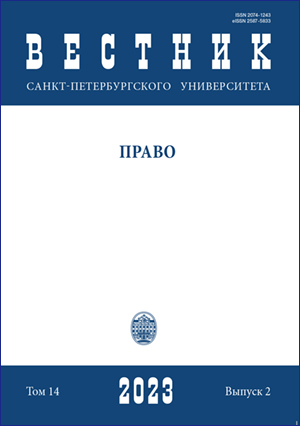Improving the quality and efficiency of lawmaking against the backdrop of modern social transformations
DOI:
https://doi.org/10.21638/spbu14.2023.215Аннотация
In the modern era, social transformations contribute to the dynamic development of basic legal frameworks governing public relations. Consequently, the lawmaking process is facing a certain crisis due to the rising legislative inflation and a gap between the pace of social change and lawmaking mechanisms. In these circumstances, improving lawmaking activities should be based on doctrinal developments, including those concerning lawmaking quality and efficiency. The article uses constructivism methodology to illustrate the inextricable connection between the legal process and law enforcement, which is seen as the first stage in the process of shaping the legal reality. The authors analyze how domestic legal thinking has evolved in relation to the efficiency and quality of lawmaking. A list of the criteria and parameters proved by Soviet and post-Soviet scientists was compiled. It is shown that lawmaking activity efficiency and quality are dialectically related. It is justified to consider the social determinants that affect lawmaking efficiency. Accordingly, it is concluded that the efficiency of legal norms should be measured by what impact their application has had on society, in what extent they have met the goals of social management at the given stage of social development. The authors propose three levels of measuring the efficiency of legal norms in modern society: formal-legal, axiological and general social. The value of legal monitoring is highlighted in assessing the quality of lawmaking and determining the extent to which legal norms are efficient.
Ключевые слова:
lawmaking, efficiency of lawmaking, quality of lawmaking, legal norms, society, law enforcement, legal reality
Скачивания
Библиографические ссылки
Загрузки
Опубликован
Как цитировать
Выпуск
Раздел
Лицензия
Статьи журнала «Вестник Санкт-Петербургского университета. Право» находятся в открытом доступе и распространяются в соответствии с условиями Лицензионного Договора с Санкт-Петербургским государственным университетом, который бесплатно предоставляет авторам неограниченное распространение и самостоятельное архивирование.






